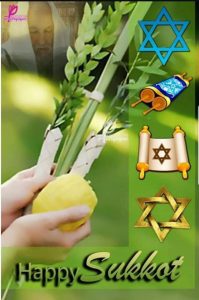 This festival is the first of three pilgrimage celebrations.
This festival is the first of three pilgrimage celebrations.
The festival of Sukkot is in the Jewish tradition, a period in the year when fruits are used as intermediaries of communication with the Divine.
Not only is this fact typically common to African cultures in general, but the fruits recommended by the Torah for this holiday typically grow in Africa.
The construction of the Sukka, the ritual hut, with its specificities, and the fact of residing there for a certain period goes back to the Baka peoples, and other ‘Pygmy’ nations of Central Africa. Should we see in the Sukkot festival a willingness of the Jewish community to perpetuate a specifically African memory that would highlight the Pygmy cultures?
All the plant species used to pray during this festival are African. The customs of dancing in a circle with palm tree branches are African.
To notice the beauty of the fruit with religiosity, to pray with the fruit, to pray for the fruits, to live among the branches erected in a hut by refraining from using the metal, to be conscious of the sanctity of this natural space during a period of consecration, all this has a typical African resonance highlighting elements of culture that go back to Central Africa.
Through the festival of Sukkot which asks us to include – so to honor – African plant species in our spiritual memory, and asks us to practice our freedom by living in natural and temporary dwellings for a period of recall, we see that Africa is part of Judaism’s Divine gaze on human destiny and its liberation.
